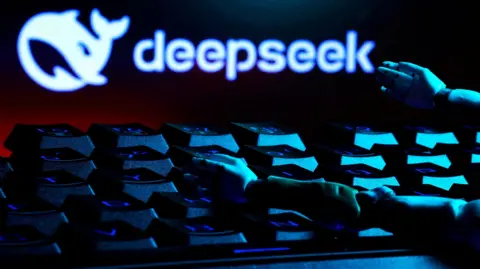In a shocking turn of events, U.S. national security officials are beginning to closely examine the implications of a groundbreaking artificial intelligence (AI) breakthrough from the Chinese company DeepSeek. White House press secretary Karoline Leavitt has confirmed that this development has raised alarms among top officials, underlining the potential risks posed by technological advancements from adversaries. This scrutiny comes on the heels of reports that the U.S. Navy has advised its personnel against using DeepSeek’s applications, citing “potential security and ethical concerns.”
OpenAI, the entity behind the famed ChatGPT, has committed to collaborating with the U.S. government to mitigate the risk of competitors accessing its proprietary technology. Just this week, DeepSeek’s affordably priced yet powerful AI model sparked a tremor in the stock prices of U.S. tech companies, leading investors to reassess the substantial funds they have been pouring into new AI infrastructure.
Ms. Leavitt noted that discussions with the National Security Council are ongoing, as they evaluate the national security ramifications of DeepSeek’s rise. She reiterated sentiments echoed by former President Donald Trump, who characterized DeepSeek’s emergence as a crucial wake-up call for the American tech industry. Reports indicate that the U.S. Navy has sent internal communications alerting staff not to engage with DeepSeek’s app due to apprehensions regarding its origins and intended usage. A response from the Navy has yet to be obtained.
Concerns have escalated as David Sacks, the newly appointed “White House AI and crypto czar,” suggested on Fox News that DeepSeek might have benefitted from insights gleaned from models developed by OpenAI. This process, known as knowledge distillation, enables one AI model to learn from another, raising additional concerns about the potential for intellectual property theft within the AI sector.
Sacks asserted that there is considerable evidence suggesting DeepSeek has utilized knowledge from OpenAI’s models. He predicts that U.S. AI leaders will implement initiatives in the coming months to thwart such practices, effectively slowing down the development of so-called “copycat” models. OpenAI, in a subsequent statement, emphasized that both Chinese firms and others are persistently attempting to extract knowledge from leading U.S. AI models and expressed their commitment to employing measures to safeguard their intellectual property.
In a notable twist, DeepSeek has reported being the target of cyberattacks recently. Due to these “large-scale malicious attacks,” the company disclosed it would temporarily restrict new registrations. Their website currently carries a notification indicating that sign-ups might experience delays as a consequence of ongoing cyber issues. A Chinese state broadcaster’s social media channel, Yuyuan Tantian, has asserted that DeepSeek has faced several intensified cyber attacks in recent weeks.
DeepSeek gained notoriety last week when AI enthusiasts celebrated its innovative model, leading to a surge of downloads for its chatbot. The company’s success contributed to a temporary slide in U.S. technology stock prices, although many of these stocks have since rebounded. The U.S. tech sector has been shaken, particularly as many believed the country had a significant lead in the AI race, supported by stringent trade restrictions designed to limit China’s access to advanced semiconductor technology.
Despite their increasing investment in cutting-edge technology, experts assert that the U.S. retains a competitive edge, primarily due to its prevalence of major chip manufacturers. Questions linger regarding the methodologies employed by DeepSeek to develop its model and the potential longevity of its success. Reflecting on the impact of DeepSeek’s achievements, Trump remarked that they should be perceived as opportunities for the U.S. to innovate more cost-effectively, indicating an optimism about the American tech industry’s resilience.
As developments continue in this dynamic arena, industry leaders and government officials are engaged in a careful balancing act of enhancing cybersecurity and fostering innovation while safeguarding national security against emerging threats from internationally contested technologies.



